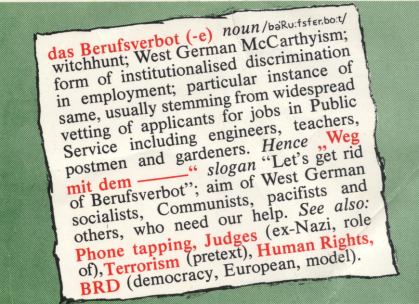|
|
|
|
Berufsverbot can be variously translated as:-
 Regardless of how we translate 'Berufsverbote' the result is fear of job loss or of getting one at all, withdrawal from political life, quietism, inaction, denial of democratic and internationally recognized political rights. Historical Overview The so-called "Edict against Radicals", which is the basis for the "Bans from Civil Service by Government Ruling" (Berufsverbot) was enacted in 1972 in order to keep politically active people out of the civil service and to intimidate like-minded persons. All in all there were 11,000 official "Ban" proceedings, which resulted in the rejection of 1,250 applicants for civil service positions, some of these proceedings being drawn out for over 20 years. After 1979 this instrument of repression has been only partially or sporadically applied. In spite of that, it is still embedded in the laws of many German States, for example in the "Civil Service Law of Baden-Würrtemberg". This form of political intimidation is unique in Europe and has been condemned by many international civil liberties organizations as a clear violation of human rights. In 1995 the European Court of Human Rights decided accordingly in the case of an high school (Gymnasium) teacher affected by the "Ban". This decision established the precedent that the practice of "Banning from Civil Service by Government Ruling" in Germany was in violation of the Freedoms of Conscience and Assembly, which freedoms are guaranteed as Basic Rights in Articles 10 and 11 of the European Convention on Human rights. >> More detailed historical background |


